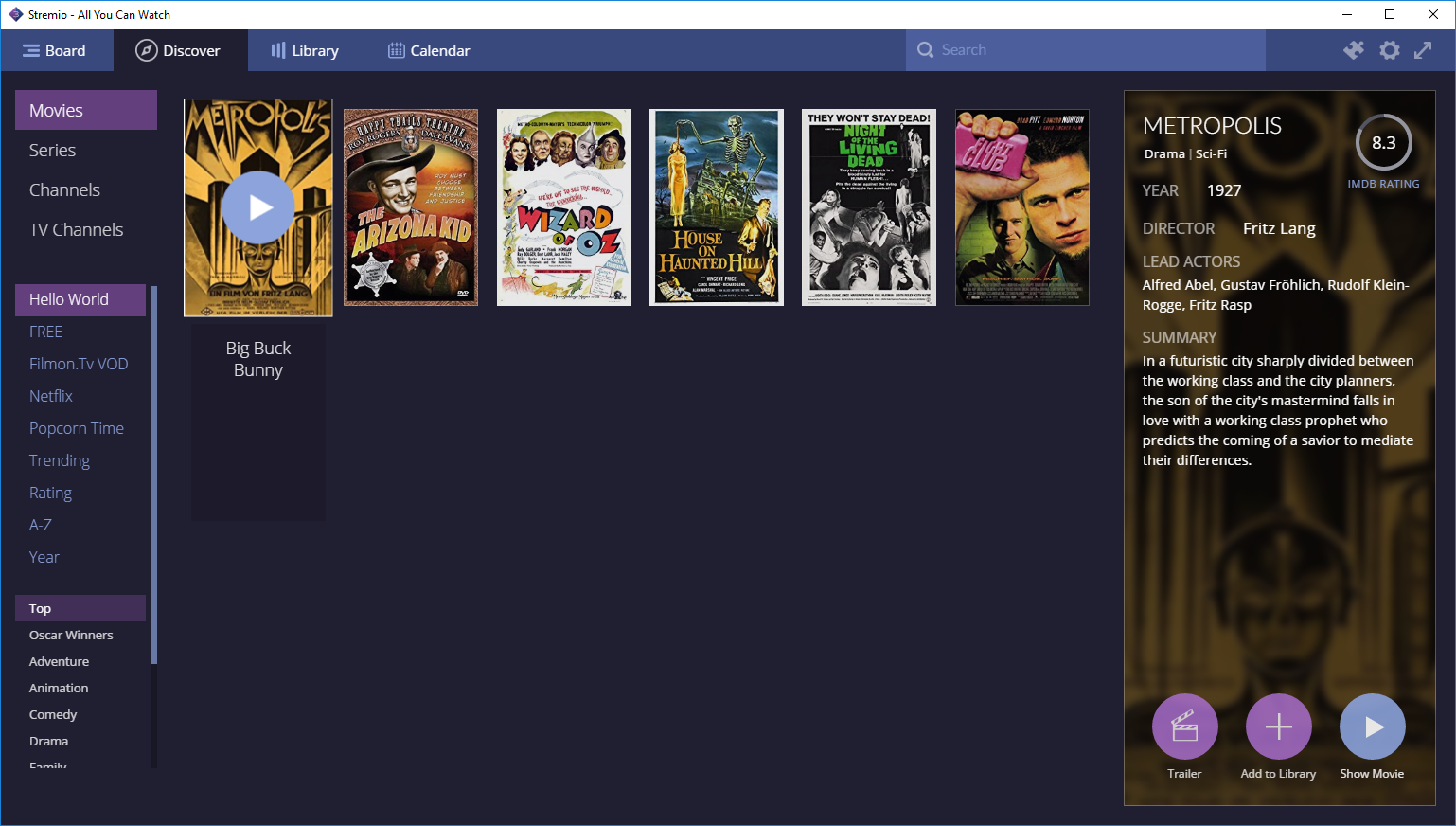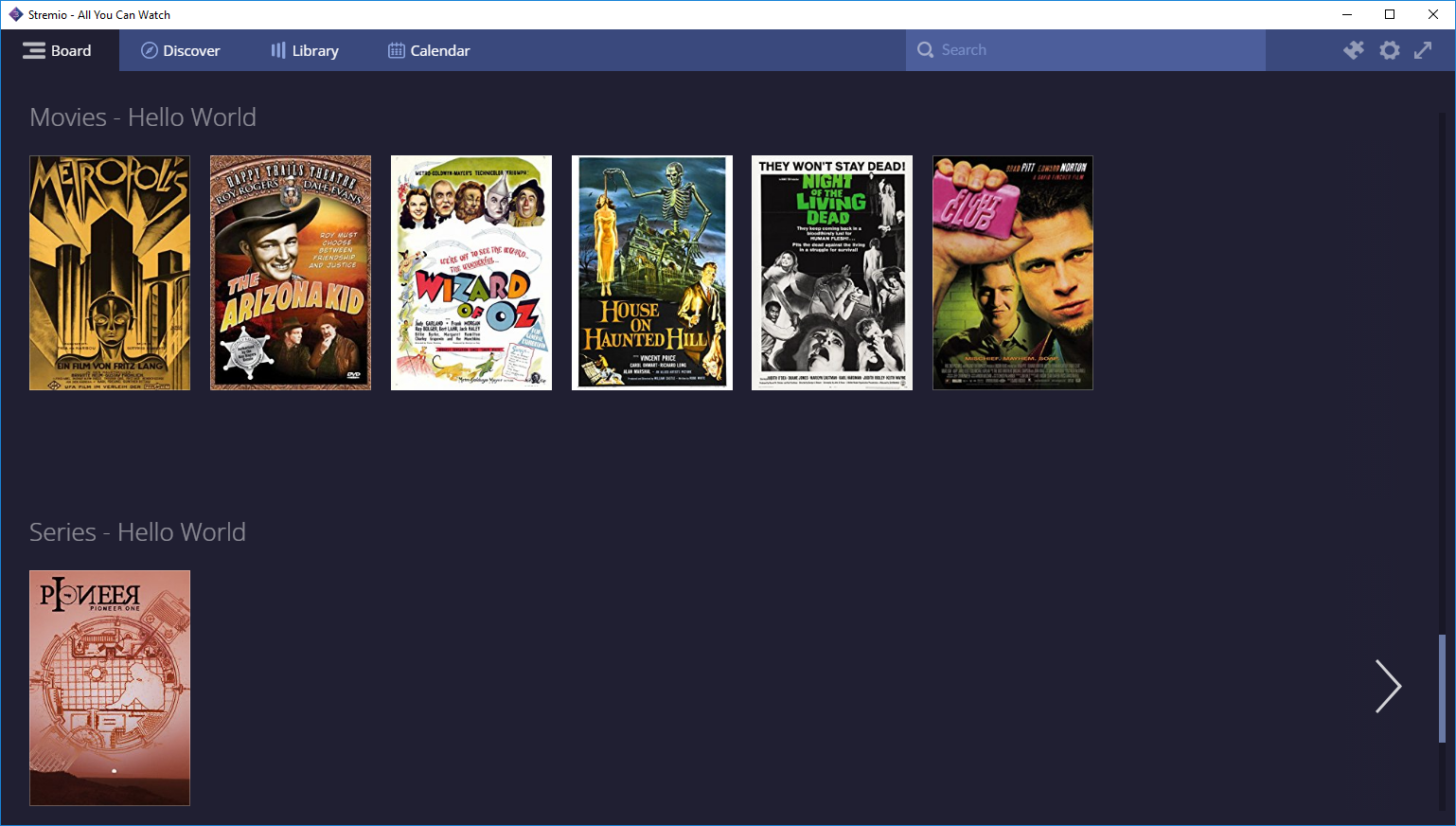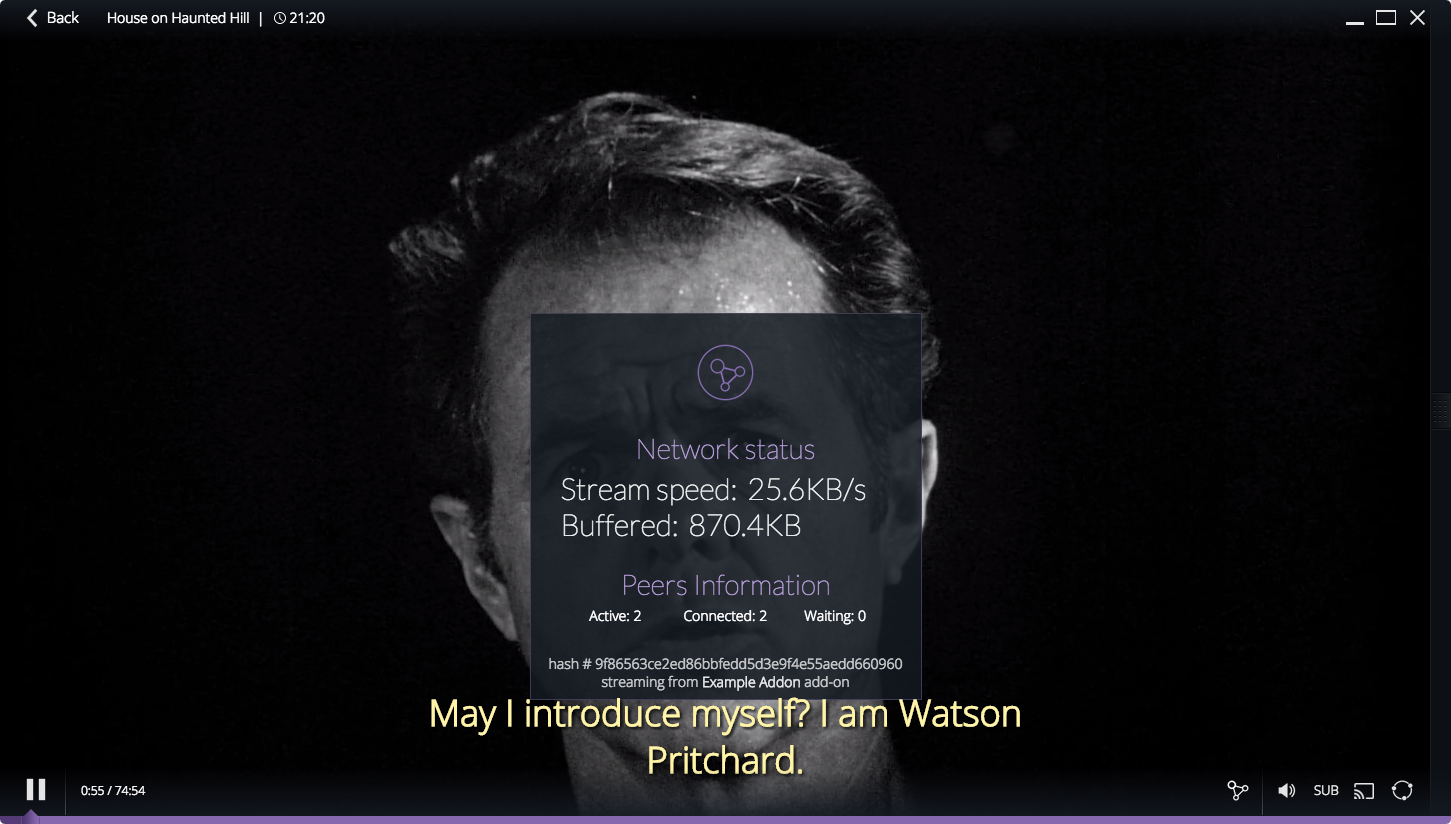This example shows how to make a Stremio Add-on with Stremio's Add-on SDK.
Alternatively, you can also see how to make a Stremio Add-on with the Express NPM module at Stremio Express Add-on Hello World, or explore our many other examples.
npm install
npm startThen run Stremio, click the add-on button (puzzle piece icon) on the top right, and write http://127.0.0.1:7000/manifest.json in the "Addon Url" field on the top left.
Pre-requisites: Node.js, Git
This is the first, boilerplate step of creating an add-on for Stremio. Create a node.js project and add the stremio-addons module as dependency.
mkdir stremio-hello-world
cd stremio-hello-world
npm init
npm install --save stremio-addon-sdk@1.0.x
git add *
git commit -a -m "initial commit"NOTE: to test this add-on, you need to complete Step 6. Start the add-on with node server.js and add the add-on to stremio by going to the Addons page (top right icon) and typing http://127.0.0.1:7000/manifest.json in the text field in the top left and pressing enter.
In this step, we define the add-on name, description and purpose.
Create an addon.js file:
const { addonBuilder } = require("stremio-addon-sdk");
const manifest = {
"id": "org.stremio.helloworld",
"version": "1.0.0",
"name": "Hello World Addon",
"description": "Sample addon providing a few public domain movies",
//"icon": "URL to 256x256 monochrome png icon",
//"background": "URL to 1024x786 png/jpg background",
// set what type of resources we will return
"resources": [
"catalog",
"stream"
],
"types": ["movie", "series"], // your add-on will be preferred for these content types
// set catalogs, we'll have 2 catalogs in this case, 1 for movies and 1 for series
"catalogs": [
{
type: 'movie',
id: 'helloworldmovies'
},
{
type: 'series',
id: 'helloworldseries'
}
],
// prefix of item IDs (ie: "tt0032138")
"idPrefixes": [ "tt" ]
};Add to your addon.js:
const builder = new addonBuilder(manifest);To implement basic streaming, we will set-up a dummy dataset with a few public domain movies.
const dataset = {
// Some examples of streams we can serve back to Stremio ; see https://github.com/Stremio/stremio-addon-sdk/blob/master/docs/api/responses/stream.md
"tt0051744": { name: "House on Haunted Hill", type: "movie", infoHash: "9f86563ce2ed86bbfedd5d3e9f4e55aedd660960" }, // torrent
"tt1254207": { name: "Big Buck Bunny", type: "movie", url: "http://clips.vorwaerts-gmbh.de/big_buck_bunny.mp4" }, // HTTP stream
"tt0031051": { name: "The Arizone Kid", type: "movie", ytId: "m3BKVSpP80s" }, // YouTube stream
"tt0137523": { name: "Fight Club", type: "movie", externalUrl: "https://www.netflix.com/watch/26004747" }, // redirects to Netflix
"tt1748166:1:1": { name: "Pioneer One", type: "series", infoHash: "07a9de9750158471c3302e4e95edb1107f980fa6" }, // torrent for season 1, episode 1
};And then implement defineStreamHandler as follows:
// Streams handler
builder.defineStreamHandler(function(args) {
if (dataset[args.id]) {
return Promise.resolve({ streams: [dataset[args.id]] });
} else {
return Promise.resolve({ streams: [] });
}
})As you can see, this is an add-on that allows Stremio to stream 4 public domain movies and 1 series episode - in very few lines of code.
Depending on your source, you can implement streaming (defineStreamHandler) or catalogs (defineCatalogHandler) of movie, series, channel or tv content types.
To load that add-on in the desktop Stremio, click the add-on button (puzzle piece icon) on the top right, and write http://127.0.0.1:7000/manifest.json in the "Addon Repository Url" field on the top left.
We have 2 methods serving meta:
-
defineCatalogHandlerserves basic metadata (id, type, name, poster) and handles loading of both the catalog feed and searching; -
defineMetaHandlerserves advanced metadata for individual items, for imdb ids though (what we're using in this example add-on), we do not need to handle this method at all as it is handled automatically by Stremio's Cinemeta
For now, we have the simple goal of loading the movies we provide on the top of Discover.
Append to addon.js:
const METAHUB_URL = "https://images.metahub.space"
const generateMetaPreview = function(value, key) {
// To provide basic meta for our movies for the catalog
// we'll fetch the poster from Stremio's MetaHub
// see https://github.com/Stremio/stremio-addon-sdk/blob/master/docs/api/responses/meta.md#meta-preview-object
const imdbId = key.split(":")[0]
return {
id: imdbId,
type: value.type,
name: value.name,
poster: METAHUB_URL+"/poster/medium/"+imdbId+"/img",
}
}
builder.defineCatalogHandler(function(args, cb) {
// filter the dataset object and only take the requested type
const metas = Object.entries(dataset)
.filter(([_, value]) => value.type === args.type)
.map(([key, value]) => generateMetaPreview(value, key))
return Promise.resolve({ metas: metas })
})It's time to run our add-on!
Append to addon.js:
module.exports = builder.getInterface()And now create a new file, server.js, that only contains:
const { serveHTTP } = require("stremio-addon-sdk");
const addonInterface = require("./addon");
serveHTTP(addonInterface, { port: 7000 });Run the add-on with npm start and add http://127.0.0.1:7000/manifest.json as the Repository URL in Stremio.
This add-on also supports serverless deployment, just create a new file called serverless.js, that contains:
const { getRouter } = require("stremio-addon-sdk");
const addonInterface = require("./addon");
const router = getRouter(addonInterface);
module.exports = function(req, res) {
router(req, res, function() {
res.statusCode = 404;
res.end();
});
}You can check out this now.json file that would make this add-on work with now.sh serverless deployment.
Now, if you want to deploy your add-on and make it accessible publically, proceed to our deployment guide.



